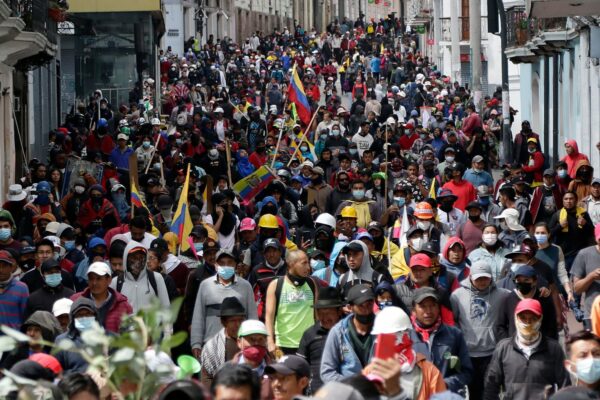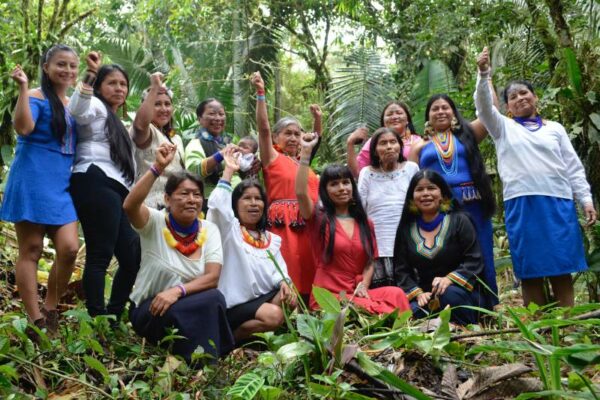Washington DC — As trade ministers from the Americas gather today in Quito, Ecuador to advance the negotiations for the proposed Free Trade Area of the Americas (FTAA), thousands of citizens from around the hemisphere are pouring into the streets of Quito. Their goal is to stop the planned free trade pact from becoming a reality and prevent the environmental, social, and economic injustices incurred by NAFTA from spreading. International observers are urging Ecuadorian Police and Military to refrain from violent retaliations against peaceful protesters, the majority of whom are indigenous, labor and rural populations.
The FTAA is a free trade agreement that would expand the reach of the North American Free Trade Agreement (NAFTA) to all 34 countries of Central America, South America and the Caribbean (except Cuba), making it the world’s largest free trade zone. It would expand the rights granted to corporations beyond those of NAFTA, producing the most far-reaching trade and investment agreement ever signed. The FTAA contains commitments to hand public services over to the private sector, including education, healthcare, and environmental protection which could further erode public interest regulations on medical standards, financial and accounting services, as well as privatize public schools, postal services, energy and water.
Similar to the failed WTO and NAFTA models, the FTAA puts the interests of corporations above the need to protect the environment, human rights, and working families. Fair trade advocates fear the agreement will increase inequality within and among nations and fuel the global race to the bottom. The FTAA will also jeopardize the ability of elected governments to pass laws in the public interest if those laws conflict with businesses’ ability to make a profit as evidenced by the controversial corporate lawsuit provision of NAFTA.
“We are here to show our opposition to FTAA because it is a project that will put an end to life, natural resources, national production, and to the environment. FTAA will only entrench neoliberalism, hunger, unemployment, poverty, and dependency,” said a statement from the powerful indigenous coalition CONAIE, whose uprisings against economic austerity measures have deposed two of the country’s presidents in the last seven years.
Despite the Bush Administration’s push to finalize the FTAA by 2005, recent elections in Ecuador and Brazil—where candidates opposed to free trade policies have garnered the most votes – illustrate that citizens are taking to the streets and to the polls to reject neo-liberal policies which they see as worsening inequality and poverty.
Doris Trujillo of Ecuador’s National Farmer Confederation (CONFEUNASSC-CNC) explains that the FTAA would change the very nature of the lives of thousands of small farmers: “For us, agriculture is fundamental. It’s part of our identity, our lives, our language, and our form of feeding ourselves. We won’t allow agriculture to be converted from a cultural activity into solely an economic and commercial one.”
Under the National Mobilization Against FTAA, a broad coalition of Ecuadorian organizations has formed to demonstrate to trade ministers that ordinary Latin Americans are opposed to the FTAA and that from Alaska to Argentina, communities across the hemisphere are taking a stand against free trade. Solidarity actions have taken place this week in San Francisco, Seattle, Portland, Boston and Washington, D.C.
The demonstrations in Quito also illustrate the diversity of the movement opposed to corporate globalization and the free trade status quo. Long before the Seattle protests against the World Trade Organization, citizens in Latin America, Asia and Africa were marching by the hundreds of thousands against the neo-liberal agenda.
According to Jason Mark of Global Exchange, “The burgeoning global justice movement is often portrayed as being led by privileged youth and academics from the world’s richest countries. In reality the global justice movement is, and always has been, anchored by the peoples of the world’s poor countries. What unites the activists in South America with their allies is North America is a deep-felt concern that “free trade” regimes such as NAFTA, the WTO and the FTAA are undermining democratic decision-making—and in the process eroding environmental and labor standards.”
Note to editor: The organizations issuing this release can assist reporters to coordinate interviews with Ecuadorian Indigenous, environment, labor and rural farm workers in Quito and/or to obtain photos and videos of the mobilizations.













